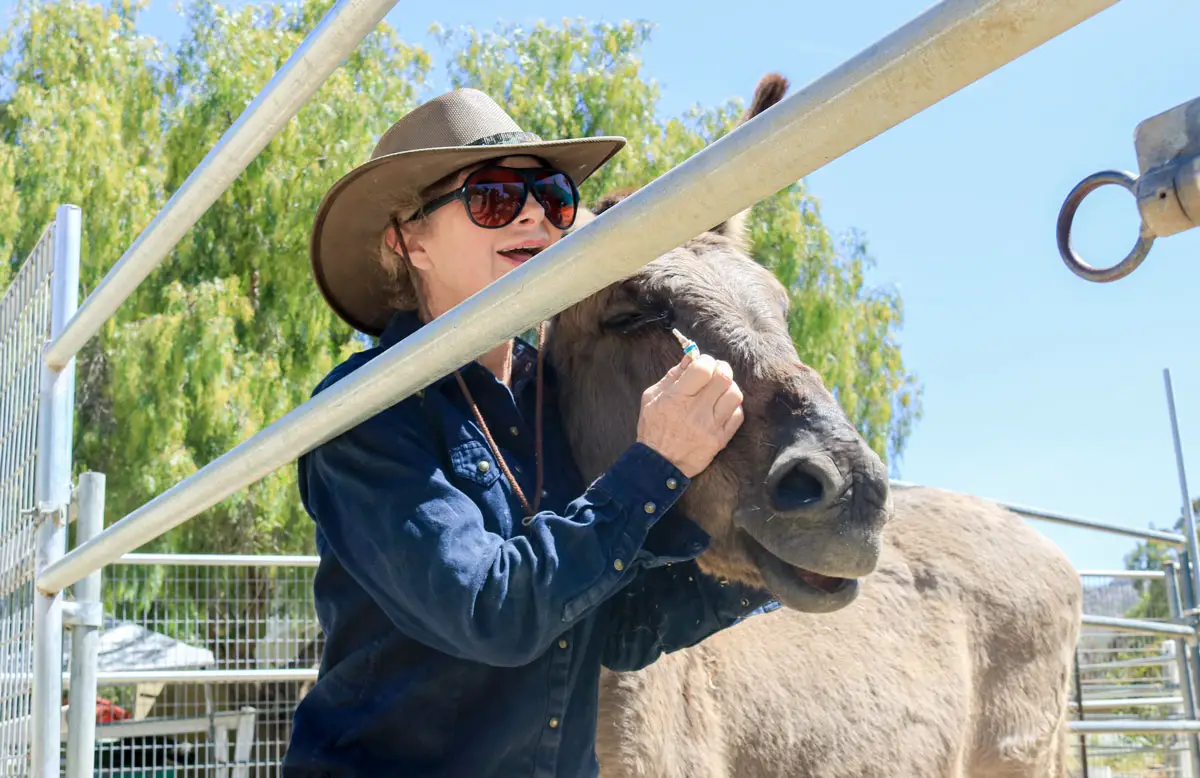RANCHO SANTA FE — Amid the upscale equestrian estates in the wealthy enclave of Rancho Santa Fe, one horse rescue continues its mission to save the horses, donkeys and other farm animals that everyone else has given up on.
With a network of volunteers both locally and throughout the western United States all led by founder Celia Sciacca, Laughing Pony Rescue has saved over 1,200 animals kept in feedlots and scheduled for slaughter, along with others that have been neglected or mistreated in the rodeo industry.
While the number of horses sent to slaughter for human consumption has decreased over the last two decades, thousands still face this fate in Canada and Mexico. Around 24,000 horses in the United States were shipped internationally to slaughter in 2020, according to the American Society for the Prevention of Cruelty to Animals.
Sciacca founded Laughing Pony Rescue in 2010 after being deeply disturbed by what she learned about the industry, particularly how animals are often kept in cramped spaces at feedlots, forced to go days without food and water while being shipped to slaughterhouses and then die painfully once they arrive rather than being euthanized.
“This is what I’m called to do,” said Sciacca. “The reason we do this is so one less horse or donkey suffers.”

There are currently 14 horses, four donkeys, a sheep and a goat under the rescue’s care, several of which were initially terrified of people and require specific diets and medical care. Many have been there for years, but the goal is to pair them with a loving home.
Ranch reality
On any given day at the ranch, there are a million things to be done. Sciacca and a team of dedicated volunteers feed and brush the animals and care for any ailments they might have, while also fundraising to save additional animals awaiting slaughter at feedlots.
Contrary to popular belief, the horses and other livestock at the lots are not given away for free, Sciacca said. The organization must pay anywhere from a few hundred to over $1,000 per animal, and since they could be shipped to slaughterhouses at any time, they have to move fast.
The organization’s work reaches beyond California to Texas, Washington state and Nevada, with volunteers constantly working to identify animals that can be saved. Jenna McKenzie, a volunteer-based in eastern Washington, talks with Sciacca frequently and sends photos of potential animals that could be rescued from feedlots and their asking prices.
“I relay information to Celia, and we select anywhere from five to 12 [horses] per month and we fundraise for them,” McKenzie said. “We’ll go anywhere and we’ll help anyone.”
Much of the fundraising is done via the Laughing Pony Facebook page. As of May 10, the organization was trying to raise the remaining $300 needed to save six horses from a feedlot, including two pregnant mares and two colts.
The animals currently under Laughing Pony’s care run the gamut from former feedlot horses, ponies with broken legs from years of roping, and a donkey named Dyn-O-Mite which used to carry explosives as part of training for the U.S. Army.
One horse named Barbie was saved from a ranch in Canada where her high-estrogen urine was used for the development of the menopause hormone-replacement drug Premarin. She was continually kept pregnant on the ranch, suffered a fractured nose and was often kept dehydrated in order to concentrate her urine, according to Sciacca.

Now safe at Laughing Pony, she is the mother of two other rescuees, Johnny Cash and Gino, the latter of which shares her striking blue eyes.
Another horse named Amigo was rescued from a feedlot in New Mexico underweight and covered in cuts, and requires a special diet and treatment for allergies. Like many of the animals at the ranch, he was terrified of humans but has since grown to trust the people he sees every day.
“They had no contact with humans. There was nothing kind or nurturing about it,” volunteer Barbara Todd said of many of the animals at Laughing Pony. “It takes a lot of patience.”
Efforts honored
The nonprofit’s hard work does not go unnoticed. In late April, Sciacca was pulled from her busy daily routine and called to the San Diego County Board of Supervisors chambers to receive official recognition, with the supervisors also declaring April 26 as Laughing Pony Rescue Day across San Diego County.
While generally averse to being in the spotlight, Sciacca said it is necessary to get the word out about the rescue and hopefully raise more donations to continue their work.
“I’m not an attention person, but it’s good to get the word out [about Laughing Pony]” she said. “We need donations, and if we don’t have the donations, we can’t pay for the horses at the feedlot. We can only save a certain amount.”
For McKenzie, it is devastating when a horse they were working to rescue ends up being shipped before they can raise the funds. Thankfully, there are many success stories, with around 100 animals saved per year.
“Even on the hardest days, these horses need us, because if we don’t do it, who will?” McKenzie said.
Education and raising awareness are just as important for Laughing Pony as the actual rescue work, with youth camps held every year and field trips offered for local schools. On Tuesday, a class of kindergarten students from the San Diego Jewish Academy visited the ranch to learn about the different animals and brush some of the horses, with more of their classmates scheduled to come in the following days.
For more information about Laughing Pony Rescue, as well as volunteering and donation opportunities, visit laughingponyrescue.org.




